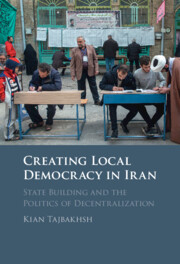Book contents
- Creating Local Democracy in Iran
- Creating Local Democracy in Iran
- Copyright page
- Contents
- Figures
- Tables
- Preface: Stumbling on Local Democracy (My Personal Journey)
- Acknowledgments
- Overview of the Book
- Abbreviations
- Part I Launching Local Democracy
- Part II Arguing for Local Democracy
- 3 Reformists, Local Democracy, and Civil Society
- 4 Efficiency in Governance
- 5 The Theocratic and Islamist Discourse on the Shura
- Part III Blocking Local Democracy
- Index
5 - The Theocratic and Islamist Discourse on the Shura
from Part II - Arguing for Local Democracy
Published online by Cambridge University Press: 07 July 2022
- Creating Local Democracy in Iran
- Creating Local Democracy in Iran
- Copyright page
- Contents
- Figures
- Tables
- Preface: Stumbling on Local Democracy (My Personal Journey)
- Acknowledgments
- Overview of the Book
- Abbreviations
- Part I Launching Local Democracy
- Part II Arguing for Local Democracy
- 3 Reformists, Local Democracy, and Civil Society
- 4 Efficiency in Governance
- 5 The Theocratic and Islamist Discourse on the Shura
- Part III Blocking Local Democracy
- Index
Summary
On the eve of victory in the 1979 revolution, Ruhollah Khomeini and his Islamists followers discussed blueprints for a new system of Islamic government. Integral to these plans was an emphasis on the new institutions of Islamic shura (local councils) to replace the secular anjumans (local associations) that existed in town and cities. The chapter details Khomeini’s call to establish elected local government in early 1979, months before the new constitution delineating the shape of the new state had been ratified, indicating the significance of the shura. I examine the tensions between the competing visions of shura within the theocratic Islamist camp, by contrasting the views of Khomeini and Mahmoud Taleghani. This chapter also discusses the aborted attempt to hold the first local government elections in the fall of 1979, a factor contributing to the new regime’s reluctance to decentralize government for another decade and a half. The chapter details the multiple and conflicting perspectives on shura during the deliberations leading to the first constitution. The ratified constitution subordinated local and national government (shura and the Majles) to the velayat-e faqih and established a settlement that shaped and constrained the future possibilities and limitations of decentralization in the ensuing decades up to the present day.
Keywords
- Type
- Chapter
- Information
- Creating Local Democracy in IranState Building and the Politics of Decentralization, pp. 126 - 152Publisher: Cambridge University PressPrint publication year: 2022



